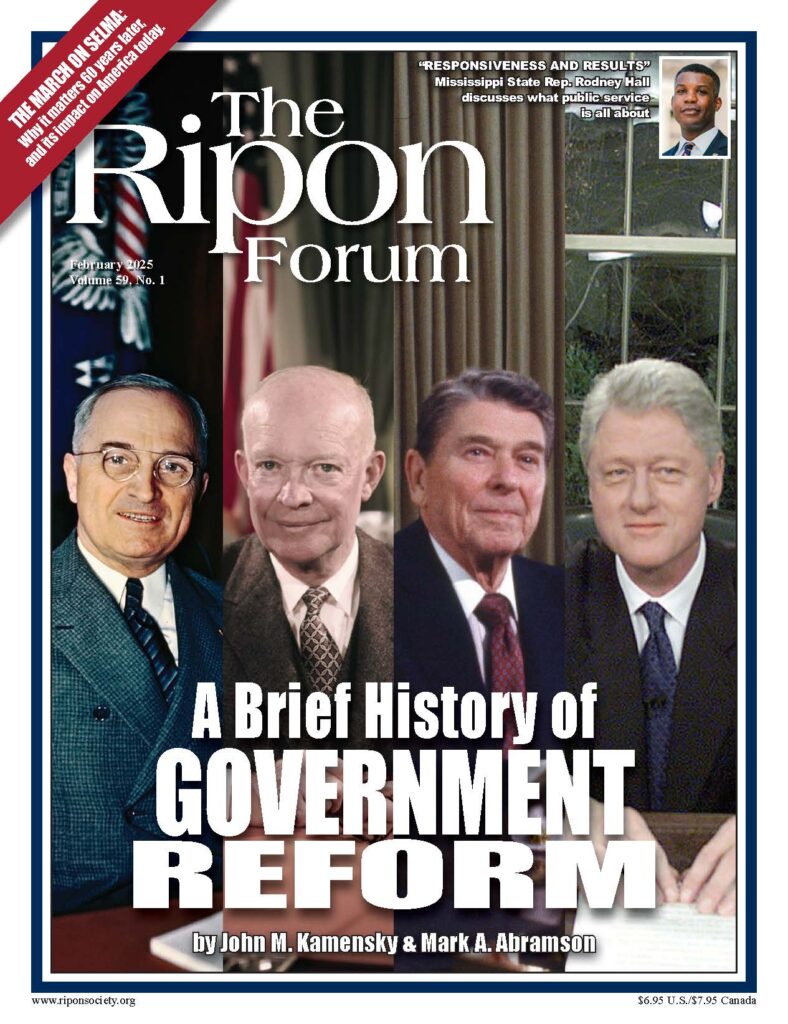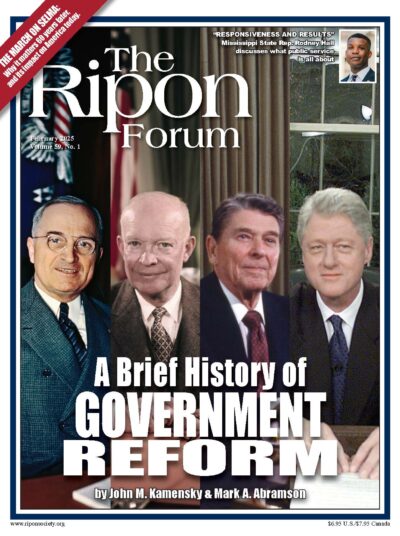
At a time when federal agencies are being scrutinized and federal employees are being subjected to a review that some are calling unfair and others are calling long overdue, the latest edition of The Ripon Forum examines the history of government reform in the United States and whether the lessons of the past are even relevant given the changes underway today.
“There have been more than 15 attempts to reform and reorganize the United States federal government since the Progressive Era in the early 1900s,” write John Kamensky and Mark Abramson in the lead essay for this latest edition of the centrist Republican journal of political thought and opinion. “The latest of these efforts … is literally shaking the foundation of official Washington with its no-holds-barred approach.”
Citing past reform efforts launched by Presidents Truman, Eisenhower, Reagan, and Clinton, Kamensky and Abramson note that, “There is evidence that including career civil servants in the work of a reform initiative can increase the success of the ‘improving program’ initiatives since they can gain ‘buy-in’ from the civil service.” But, they add, the current effort being led by Elon Musk and the Department of Government Efficiency “has not been operating like any of these past reform efforts…” As a result, the pair conclude, “America is in uncharted territory when it comes to government reform.”
Iowa Senator Joni Ernst, who leads the DOGE Caucus in the Senate, agrees. “The election of President Donald Trump and formation of DOGE has broken through and disrupted business-as-usual in Washington,” Ernst writes in an essay. “Finally, the tables are turning, and we are already trimming the fat. Not a moment too soon either. The federal government is more than $36 trillion in debt, adding $3 billion a day in interest payments, and spending money faster than ever before.”
Philip Howard, one of the most respected experts on government reform in America today, has been a longtime advocate of the need to shake up the federal bureaucracy. In an essay for The Forum, he explains why restoring a sense of accountability is key to any effort to make government work. “Accountability is essential not only to remove poor performers, but also to instill pride and responsibility in public culture,” he writes. “Mutual trust is difficult when everyone knows performance doesn’t matter.”
In other essays for this edition of The Forum, deficit hawk Maya MacGuineas of the Committee for a Responsible Federal Budget argues that any effort to reduce the national debt will be inadequate without also reforming the amount our country spends on entitlements. Scholar Philip Joyce examines the constitutionality of the President’s actions and why the checks and balances envisioned by the Founding Fathers will only work if all branches of government play a role. Zach Mottl discusses why he believes tariffs are an essential part of America’s economic revival.
In a special feature examining the 60th anniversary of the March on Selma, U.S. Sens. Katie Britt, Chris Coons, and Maggie Hassan and U.S. Reps. Jay Obernolte and Terri Sewell are joined by Faith & Politics Institute President Robert Traynham in examining the impact of this historic event and why the courage demonstrated by the Civil Rights Activists who marched from Selma to Montgomery, Alabama in March of 1965 still resonates in America today.
And in the latest Ripon Profile, Mississippi State Representative Rodney Hall — the first black Republican elected to that state’s legislature since reconstruction — discusses, among other topics, what public service means to him.
As always, we hope you enjoy this edition of The Ripon Forum, and encourage you to contact us with any questions or comments you may have.
Lou Zickar
Editor of The Ripon Forum
louzickar@riponsociety.org




